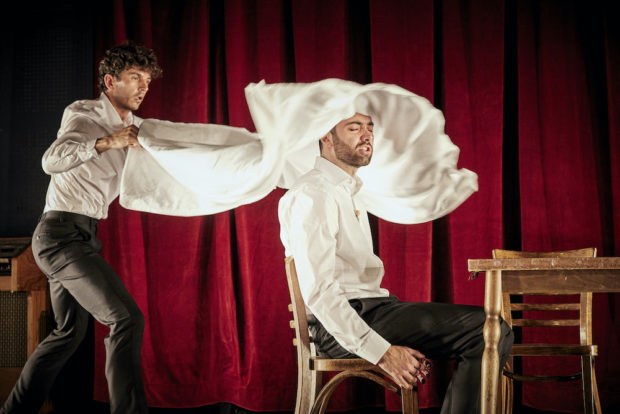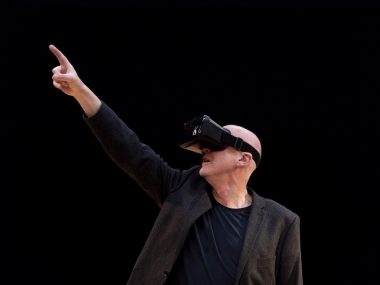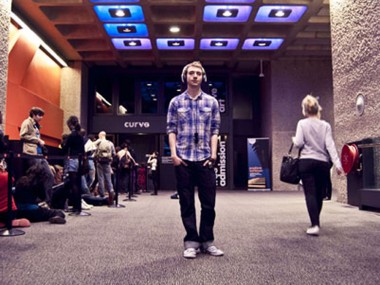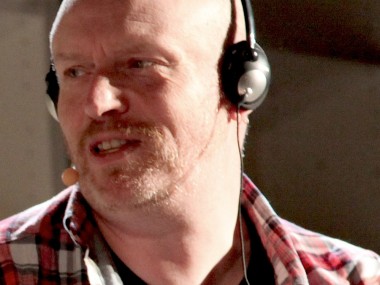L’Addition, Battersea Arts Centre
Tuesday 5th November 2024

Can experimental theatre survive the decades? This year marks the 40th anniversary of the Forced Entertainment theatre company, whose mission is summarized (by themselves) as “tearing up the rulebook”. It is also the 50th anniversary of this venue, which began life as the Battersea Arts Centre all those years ago, and then morphed into BAC and now proclaims itself as “a Home for the Extraordinary”. It is also one of the London hosts for the Sheffield-based Forced Entertainment’s visit to the capital with some six shows and other events. One of these is the two-hander L’Addition. But is the hype around the celebration of anniversaries justified by a show like this?
The short answer is yes! So, in L’Addition (French for the bill, but also suggesting in English the adding one thing on top of another) two actors, Bertrand Lesca and Nasi Voutsas (the performance duo Bert & Nasi), walk onto an empty stage, which they tell us is a restaurant. In fact, there is a table with a white table cloth, a knife, a fork and a spoon. And a glass. The customer sits down, and orders some wine. The waiter brings the bottle and then pours a sip for the other to taste; that done, and a nod of approval given, the waiter pours the wine into the glass, but instead of stopping when it’s almost full, he keeps pouring. And pouring. And pouring. And pouring.
But before this acted out, there’s the prelude. A French guy and a Greek guy walk onto the stage. Yes, it sounds like a joke. So. Since it sounds like the start of a joke, why not play it for laughs? Sweet talk the audience.* Which is exactly what Lesca and Voutsas do. With an amazingly tentative charm, smiling and warm, they tell us what they propose to do: they outline the restaurant scenario, emphasising its simplicity, its comedy, and the fact that they will repeat the action with variations. They discuss whether it would be too confusing if they swap roles, with Lesca first being the waiter and then Voutsas taking the role. Or will it be the other way around? So maybe not so simple after all.
This introduction, with both performers repeating each other’s words, talking over each other, agreeing with each other, disagreeing with each other, eyeballing the audience and exuding good cheer, is hilarious. The audience loves them. We can’t wait for them to begin. And soon they do. The customer sits down, the waiter arrives, the customer orders wine, the waiter brings it, the customer tastes it, approves it, and the waiter pours and pours and pours. Wait! Stop! The customer jumps up to avoid the wine which spreads over the table cloth, then helps the waiter clean up the mess with linen napkins. Then this scenario is repeated. With variations.
Of course, spoiler alert, there is no actual wine, no coloured water, no liquid. Everything is mimed, everything takes place in the imaginations of the audience. From the start, as the duo explain at length that their righthand side is the spectators’ left, and vice versa, the piece is about how we experience theatre, how performers relate to those who pay to watch them. So whatever happens among the audience, when someone pops out during a relaxed performance or another person sneezes, can be integrated into whatever is happening on stage. At one point, Lesca and Voutsas imagine that they are staging their scenario in 2074, 50 years in the future, then they look at the audience — it’s a reminder that many of us won’t be here in 50 years time. Funny, but sad too.
This mixing of the serious with the silly is the tone of the 70-minute piece, whose variations are sometimes gently surreal, sometimes overtly slapstick. In one excruciatingly long episode the increasingly irritated customer begs the waiter, who has completely frozen, to pour, please pour, just pour, pour the wine. Pour the wine! Pour it! Anyway. In general, the repetition of the scenario, over and over again, suggests the habitual social rituals of daily life, and the occasional shouting is an indication of desperation — how our lives sometimes seem to spin out of control. Yet Lesca and Voutsas are perfectly in control of the show, and the improvised moments sit happily with the set-pieces.
There’s a memorable phrase that Samuel Beckett used in his 1931 essay on Marcel Proust: “Habit is the ballast that chains the dog to his vomit.” Beckett suggests that involuntary moments of memory are stimulated by our habits. Habit is a great deadener, it makes us switch off: in this state, surprising remembrances can surface. In L’Addition, the hegemonic rule of these regular habits is deliberately disrupted, awakening us to the ritualistic quality of daily life and freeing us momentarily from the deadening effects of everyday actions. In this case: no unexpected memories necessary. What is also disrupted is the relationship of customer and waiter, master and servant, employer and employee.
This English-language version of L’Addition (first staged in French at the 2023 Avignon Festival) was a hit at this year’s Edinburgh Festival, and Lesca and Voutsas, who have devised the piece, are directed by Tim Etchells of Forced Entertainment, who also helped with the text. As a performance duo, Bert and Nasi exude a wonderful confidence and charm, while also alternating between restrained farce and frantic meltdown. They are helped by Alex Fernandes’s lighting and Graeme Miller’s hypnotic sound design. It’s a very funny show, but also one which leaves plenty of room for the audience to consider the nature of theatre, the power relations of any couple, and the fragility of social norms. And who pays for what?
* Footnote: I think I’ve ripped off a couple of sentences in this paragraph, but I don’t remember from where…
This review first appeared on The Arts Desk




